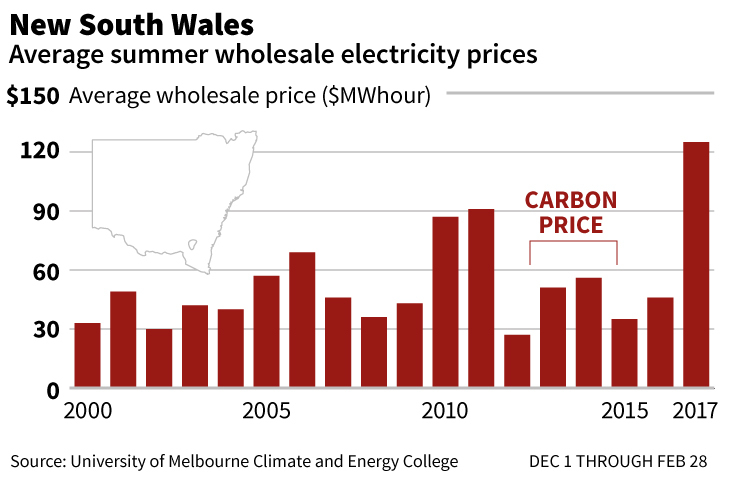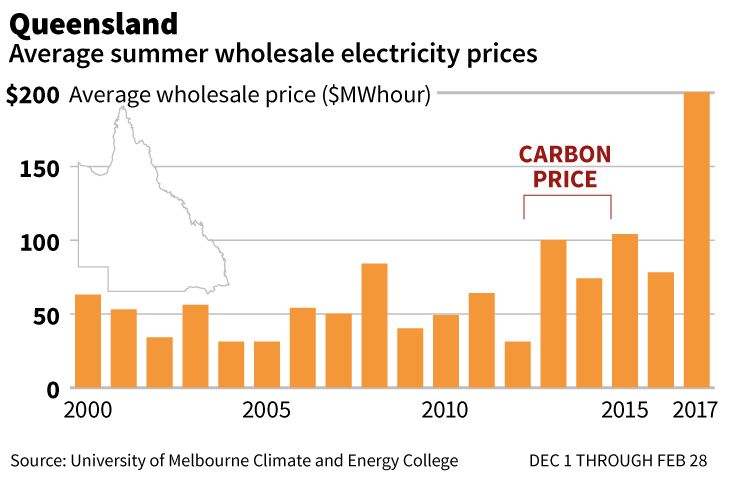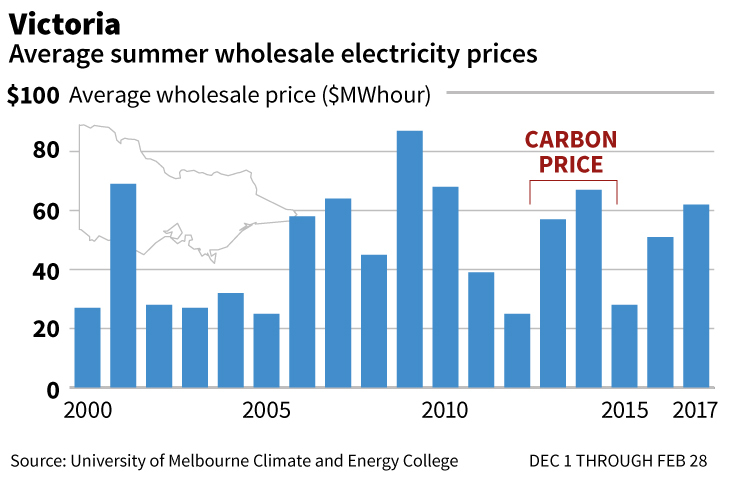The government floated the idea they would fund a clean coal plant. Only one group has expressed interest in doing so, headed by a Mr Clive Palmer. No utilities player wants to build a coal plant and no bank wants to finance it. Talk of new coal plants is not coming from the electricity industry.
So it’s just fantasy stuff to get the electorate angry/worried now. Well, that is right out of their playbook.
Unfortunately yes, it’s the liberals and the right wing groups using it as a political tool. We’ve seen it in here repeatedly, with all the BS on SA blackouts.
I highly doubt a coal plant will ever be built in Australia again, primarily due to finance. No Bank will be interested in financing an asset with 40 years useful life, given the uncertainty around emissions legislation. You could build it now and the world agrees to strict emissions cuts or no coal and the loan to finance the plant is suddenly at risk. Banks are not going to risk a billion dollars on that kind of bet.
The only way a new coal plant will be built in Aust is if the govt agrees to compensate the owners for the financial loss if a carbon price is imposed in future.
Which would be an utterly crazy thing for the govt to do, but I wouldn’t put it past the current mob.
Well, I don’t consider myself left or right politically, but re. CC I do respect the scientific process & its findings. It would be arrogant & ignorant not to. Politicisation of the issue just leads to idiots like E12 and WW taking sides because of ideology and against all rational argument, when what is desparately needed is a bi-partisan, coordinated national approach to both emissions reduction and energy security.
By making the point of the CEFC green bank irrelevant and throwing away sensible and vital investment money.
I guess they may as well. They’re not interested in raising revenue from mining either.
I’m not sure what to do here. I’ve honestly put up fair arguements with no name calling, i’ve used sources for them to go back to, i’ve used fairly straight forward terms and yet I never get a fair reply.
Mate, they’re not here for a discussion. They’re here to preach their nutty doctrine and undying loyalty to the far right of politics.
Energy crisis: Wholesale power prices have doubled since the carbon tax was axed
Adam Morton
A growing crisis in the electricity market has led to wholesale power prices more than doubling in a year - and rising to at least twice what they were under the much-maligned carbon price.
An analysis by the University of Melbourne’s Climate and Energy College, produced for the Greens, found the average wholesale electricity price soared to $134 a megawatt hour in the summer just finished, compared with $65-$67 in the two summers the carbon price was in place.
Eastern Australia experience an unprecedented heat wave this summer as evidence linking climate change with burning fossil fuels grows ever stronger. Courtesy ABC News24.
It nearly tripled in 12 months in Queensland and NSW, and doubled in South Australia. Only Victoria escaped among eastern mainland states.
The dramatic increase has been largely blamed on soaring gas prices and investment uncertainty over what power plants to build as ageing coal generators shut down.
It is fuelling mounting calls for a bipartisan energy plan, including a return to some form of carbon trading, to limit future price rises and keep the lights on as Australia cuts greenhouse gas emissions to meet its international climate targets.
Mining giant BHP Billiton, the National Farmers Federation, South Australian Premier Jay Weatherill and the country’s biggest energy companies are among those to calling for an emissions intensity scheme for the electricity sector – a policy the Turnbull government has ruled out – as a low-cost way to fill the policy vacuum.
Wholesale electricity prices are soaring.
It is a different model to the Gillard-era carbon price scheme that was repealed in 2014 following claims by Coalition MPs it would lead to devastating increases in prices that would wipe South Australian steel centre Whyalla from the map and push the cost of a roast beyond $100.
Greens climate and energy spokesman Adam Bandt said the analysis showed the extent to which electricity prices had risen under the Coalition. National emissions have also increased.
Mr Bandt said the biggest surge had been in Queensland and NSW, both overwhelmingly reliant on coal-fired power.
“The Liberals’ credibility is shot. This is game over for the Liberals’ electricity-bill scare campaign,” Mr Bandt said.
“High prices have nothing to do with renewables or state government [renewable energy] targets and everything to do with the Liberals’ failure to properly run our national energy network.”
Mr Bandt said prices could be driven down by building more renewable energy and storage capacity, and the introduction of a national transition plan to a cleaner system.
Environment and Energy Minister Josh Frydenberg said wholesale prices were being pushed up by a range of factors, including high demand for limited gas, which the government was attempting to address, and renewable energy pushing out some cheaper coal-fired plants.
He stressed the role of gas as a transition fuel with only half the emissions of coal.
“This is why we are calling on the states and the Northern Territory to drop their counter-productive gas bans and moratoriums . . . We need more gas and more gas suppliers to increase competition and drive down prices,” he said.
“What we won’t do is pursue a reckless 50 per cent renewable energy target like that of Bill Shorten and Labor Party which will drive up electricity prices and put at risk our energy security.”
In a report to be released on Thursday, the Australian Energy Market Operator warns parts of south-eastern Australia could run short of gas within two years, potentially triggering electricity blackouts and household shortages for cooking and heating.
Labor climate and energy spokesman Mark Butler said Prime Minister Malcolm Turnbull was ignoring investor, business and expert calls for an emissions intensity scheme.
“Without a drastic and urgent change in direction, [the Coalition] will be remembered as the government that blamed straw men as they oversaw the greatest energy crisis in Australia’s history,” he said.
The Turnbull government is reviewing its climate policies, but has ruled out introducing an emissions intensity scheme to help meet its 2030 target of a 26-28 per cent cut in emissions compared with 2005 levels.
Fairfax Media revealed it took this decision due to a right-wing backlash despite being advised the intensity scheme could save consumers households and businesses up to $15 billion in electricity bills over a decade.
Experts say the national grid has more generation than it needs to keep the lights on despite nine ageing coal plants shutting in seven years. Victoria’s giant Hazelwood station will make it 10 when it closes this month.
The supply issues and high prices experienced this summer largely came on extremely hot days when air-conditioners when running at maximum capacity, and supply was down due to outages at power plants or along transmission lines.
Dylan McConnell, from the Climate and Energy College, said the high price of gas – pegged to demand on export markets hungry for Australia’s liquefied natural gas - was affecting wholesale electricity prices.
Gas sets the marginal price because it is required to keep the lights on when the wind does not blow.
This particularly affects South Australia, which has a far greater proportion of gas and wind than other states, but flows through to prices in Queensland and NSW.
Mr McConnell said Queensland was also hit by a lack of competition - its power stations are owned by two state-owned companies where there used to be three – and increased demand to operate the huge LNG plants built in recent years.
Victoria was less affected because it is the most connected state in the national grid, with links to South Australia, Tasmania and NSW, and because it still gets much of its power from brown coal.
Unlike gas and black coal, brown coal is not exported – it is too volatile and dirty – and its price not affected by international markets.
But the wholesale price in Victoria is expected to increase when Hazelwood closes.
“Because wind farms”
Well, I don’t consider myself left or right politically, but re. CC I do respect the scientific process & its findings. It would be arrogant & ignorant not to. Politicisation of the issue just leads to idiots like E12 and WW taking sides because of ideology and against all rational argument, when what is desparately needed is a bi-partisan, coordinated national approach to both emissions reduction and energy security.
It will always be a political issue. Anyone who thinks otherwise is living in fantasy land (which happens to be another trait of the left - ie have this idea that they are entitled to control or influence how people think).
I agree there needs to be a bi-partisan approach. I wish both parties would get together and sensibly discuss how important reliable and inexpensive energy is to this country.
You can tell how deluded these religious types are when they still insist that SA’s energy crisis is nothing to do with renewable energy.
Its all just one big coincidence.
We stopped the program so it didn’t work. Thereby justifying stopping it. Mmm, circular.
PP said the program was a ‘success’ - yet no reduction in climate change.
What is the end goal here?
To reduce emissions or to halt climate change?
Again, they’re not seperate issues. Why the false dichotomy?
Again, they’re not seperate issues. Why the false dichotomy?
Rubbish - I guarantee in 50 years man will have been smart enough to work a way around this problem without ruining millions of peoples lives based on a concept that doesn’t even achieve an outcome.
You guarantee it, huh.
To quote:
*Are more concerned with ‘appearing’ to do something than actually doing something.
*Are not interested in results based outcomes.
*Tend to over-dramatise events.
Have a tendency to label people - ie misogynists, denialists, racists, bogans etc.
Are not generally impacted by their own solutions, ie students who live at home with Mum & Dad, inner city lawyers who can afford any extra costs, public servants who are basically immune from job cuts.
I guarantee in 50 years man will have been smart enough to work a way around this problem
Smart people have already essentially solved it. Best methods are to reduce energy intensity(i.e renewable and electric cars) and to stop deforestation. Other bad sources of greenhouse gases such as farming and concrete production are harder to solve. Is there a cost to transition, is there increased running costs, yes. But its only people like you who infer its going to ruin peoples lives. Overnight a republican said that people shouldn’t winge about $10k health premiums they should just buy less iphones. The cost to reduce emissions isn’t $10k per person, it probably is less than an iphone.
Know who it does cost a heck of a lot though…




